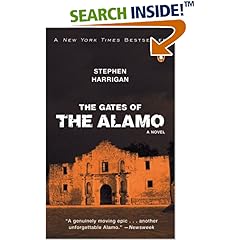 Three separate blurbs in the front of my paperback copy of The Gates of the Alamo by Stephen Harrigan compare Harrigan’s Alamo epic to Larry McMurtry’s Lonesome Dove and to other tales of Texas by Mr. McMurtry. The comparison occurred to me independently, too, but I thought Mr. Harrigan’s novel was much better than the portion of Lonesome Dove I managed to struggle through a couple of months ago.
Three separate blurbs in the front of my paperback copy of The Gates of the Alamo by Stephen Harrigan compare Harrigan’s Alamo epic to Larry McMurtry’s Lonesome Dove and to other tales of Texas by Mr. McMurtry. The comparison occurred to me independently, too, but I thought Mr. Harrigan’s novel was much better than the portion of Lonesome Dove I managed to struggle through a couple of months ago.
In fact, even though The Gates of the Alamo is obviously designed to appeal to the mostly male fans of historical war sagas and even though I could have done without some of the violence and crude behavior of some of the characters, I read the book in two days, absorbed in the narrative, the characters, and the history.
Mr. Harrigan says in his author’s note at the end of the book that he “made a pledge of absolute fidelity to the truth of the events.” He goes on to say: “That is a naive pledge, though, as any historian will tell you.”
The Alamo is to Texans what Gettysburg is to unreconstructed Confederates —sacred ground, a loss that became a victory, full of mysterious significance, a mythology not to be tampered with or revised. Mr. Harrigan’s book both tampers and revises, but as a die-hard Texican I was fascinated by the new perspectives on the story and characters of the Alamo myth, not offended or disturbed. If you’re a big fan of Sam Houston, you may want to skip The Gates of the Alamo. Harrigan’s Sam Houston is a drunkard (true) with imperial dreams of taking Texas as his own fiefdom. (I’m not so sure about Houston’s being such a grandiose blowhard who won at San Jacinto by luck, but I’m willing to grant that Mr. Harrigan has done more research on the subject than I have.) Travis and Bowie don’t come off as unadulteraed heroes either, although both, as portrayed by harrigan, have more redeeming features than does Houston. Davy Crockett, always the consummate politician even in Texas, seems to be Harrigan’s favorite of the Texian heroes.
Texas history buffs, those who enjoy war stories and Westerns, and probably all those McMurtry fans out there, will be entertained and informed by The Gates of the Alamo. The fictional characters, Edmund McGowan, a botanist who has devoted his life to the study of Texas flora and fauna, and Marry Mott, a widowed innkeeper with an obdurate and unquenchable character, weave themselves into the saga of the Alamo and the beginning of the Texas Republic as seamlessly as if they had really been there. Mr. Harrigan also presents fictional and true characters on the Mexican side of the battle who give the narrative a balanced and well-rounded panorama that is more satisfying and illuminating than a one-sided account would be. (I still can’t work up any sympathy or justification for Santa Anna, the Mesican general and dictator. He’s just a villain.)
The Alamo fell on March 6, 1836. I read The Gates of the Alamo the first week in March of this year, 2007, one hundred seventy-one years later. It was a good way to “remember the Alamo.”